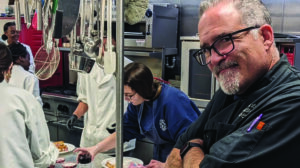By Jon Huang
I begin my day at sunrise in the parking lot of First National Bank in the middle of Rocky Ford, Colorado, an hour and a half southeast of Colorado Springs, a little over 100 miles southeast of Falcon. Minutes later, Sasha Ortiz pulls up in her pickup. I follow her just south of town, along dirt roads, to the fields of Smith Farms.
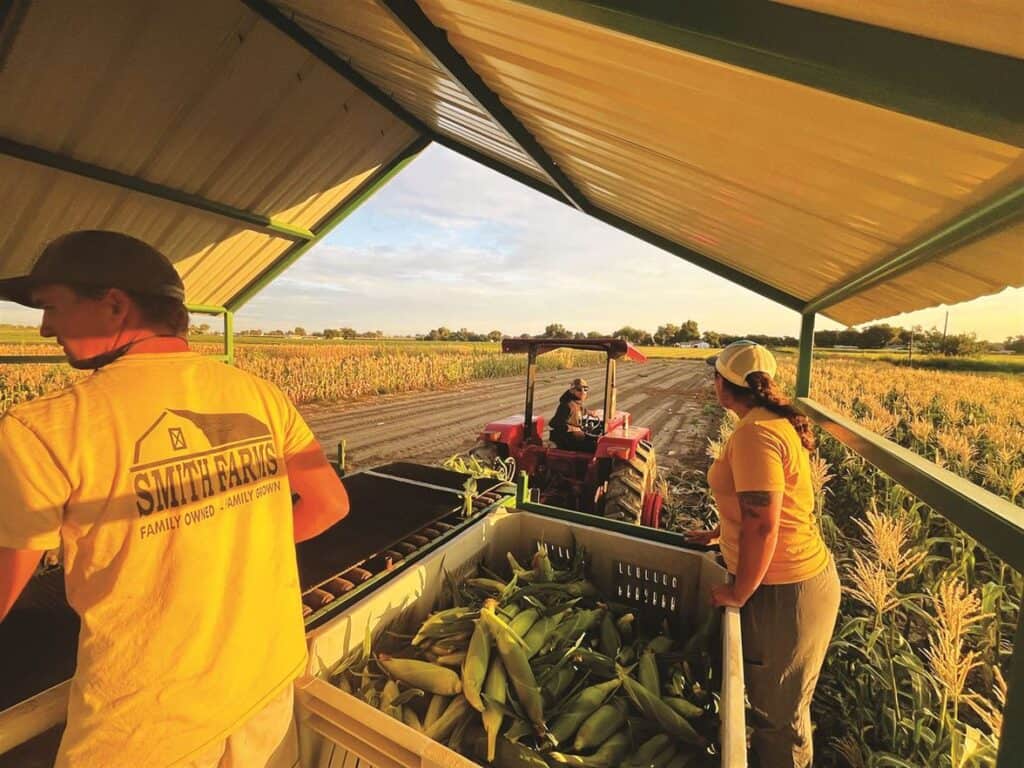
Adam Smith and Sasha Ortiz run Smith Farms. Their produce stand is in Falcon at the intersection of Route 24 and Blue Gill, a few miles northeast from Falcon’s commercial corridor. From July through the end of October, one will find a wide variety of produce, including their famous melons. Sasha Ortiz primarily runs the retail side in Falcon, while Adam farms the fields in Rocky Ford. Between the two locations, their spritely 1-year-old daughter, Emmy, has quite the playground to explore.
As the morning sun starts to peak from behind the trees, Sasha leads me through a watermelon patch until we turn left to enter the tall cornfield where today’s festivities begin. Picking our way through the maize, limbs scraping against the leaves, the growl of the tractor motor grows. Looking up, I see Adam standing above the stalks on the harvester platform. Aside from the wireless headset, he looks every bit the part of a farmer with his brown hair and tanned face. He invites me to climb aboard.
Three workers trail behind us below picking corn, loading them on the conveyor belt, up to the platform where Adam and Sasha are doing a final check.
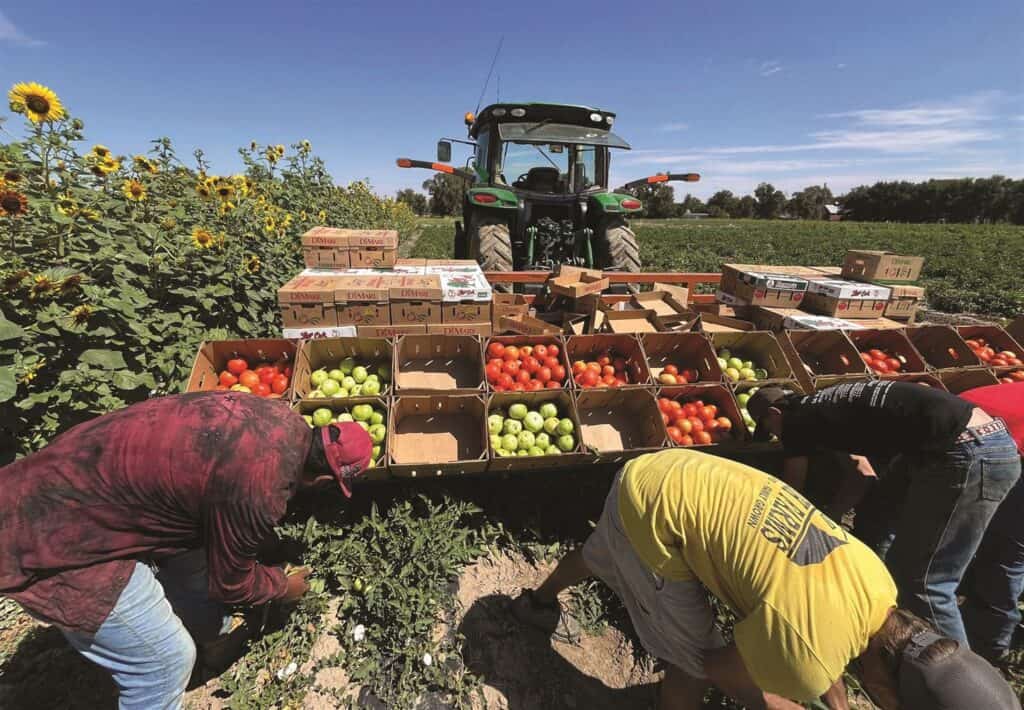
He gives me an ear of early morning sweet corn, which is sweeter because of a higher sugar concentration, he explains. The sun’s heat will convert the corn’s natural sugars into starch, affecting taste. Hence, harvesting earlier in the day helps preserve this longer.
A couple bites in and I immediately understand.
During growing season, a single corn stalk produces multiple ears, which may grow at different rates. Each season requires multiple passes through a field to harvest, picking ripe ones while leaving the immature.
Adam is 35; he didn’t go to college but has been learning his whole life. At 19, he started selling in Falcon. He grew up in Rocky Ford, where the town’s golf course, a swimming pool and school are all walkable. As a second-generation farmer, he grew up on the land, and as a child he regularly worked in the fields.
“My senior year in high school and even junior year I was skipping a lot of school to go sell produce at farmers markets in Colorado Springs,” he says.
Sometimes he would leave as early as 3 a.m. to drive up to Denver to sell at the markets. His teachers took notice. Some questioned his decisions, but Adam knew what he wanted.
He had already been farming his whole life and loved it. Even as a student, he knew he would have a lot to learn, but he knew that especially for him, the best way to learn was hands on.
Rocky Ford has long been known for agriculture, especially its famous melons. In the early 1900s, the valley became known for its sugar beets and sugar-producing factories, but by 1980, the last sugar factory had shuttered. The region’s agricul-ture has been driven by the presence of the Catlin Canal, the region’s most reliable water source. Other industries, however, in this rural town, have been slow to take root.
Farming has allowed him to stay in town. Rocky Ford has long been known for agriculture, especially its famous melons. In the early 1900s, the valley became known for its sugar beets and sugar-producing factories, but by 1980, the last sugar factory had shuttered. The region’s agriculture has been driven by the presence of the Catlin Canal, the region’s most reliable water source. Other industries, however, in this rural town, have been slow to take root.
He still remembers his first week selling in Falcon.
“We still have customers that were there within the first week,” he says. “That’s special to us and to our customers to know how involved we are.”
More recently, Adam decided to try working with grocery stores, and currently contracts with Sprouts for watermelons. Selling direct to the consumer is much simpler, he admits. Farmers can sell directly to consumers, as he mostly does, or indirectly to grocery stores.
Melons, pumpkins and tomatoes
After the corn is finished, Adam gives me a tour through the melon fields, pointing out the different varieties along the way. I see cantaloupe, but to Adam there are the eastern shippers, like the Athena variety, with their deeper sutures and lighter netting, and the western shippers, like the Valley Gold, with their heavier netting and lighter sutures. Honeydew, dove melon, piel de sapo, an orange seedless and red-seeded watermelon — the list goes on.
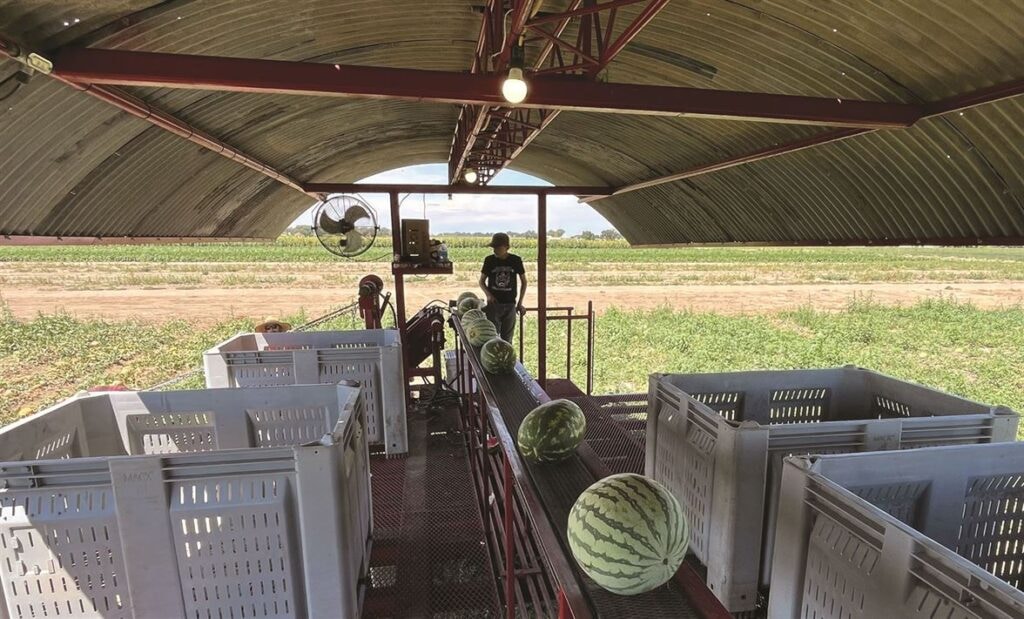
Adam sells his cantaloupe field packed, meaning straight from the ground. Back on the harvester platform, Adam explains they built their own harvester to suit their workers’ needs, specifically minimizing the carrying required to get the watermelon up and onto the platform. For him, it’s an example of how being a small business can tailor its solutions more effectively to their unique situations
“It’s a pretty cool little system. Perfect for a small farm like we have,” Adam said.
He shows me to the pumpkin patch, which will supply their yearly Giant Pumpkin Festival Oct. 19 in Falcon, with proceeds going to the Springs Rescue Mission. The next field over is an alfalfa field where his uncle is harvesting hay.
The sun is now high in the sky when I catch up with Adam and the crew in the tomato fields. A trailer is attached to the tractor. As they pick and place the tomatoes into boxes on the trailer, the tractor continues to move at less than 1 mph.
“You want to drive the tractor?” Adam asks.
It dawns on me that no one is inside driving it. He senses my hesitation. For a moment I have visions of careening the tractor into the wall of sunflowers that run along the field. “There’s nothing to it,” he reassures me. “Just don’t tell OSHA.”
The tractor’s speed is controlled with a dial. The air conditioning blows from the vents while the country music blares from the speakers. Trailing behind, the crew, including Adam, pick the tomatoes. After about 20 minutes watching and adjusting the dial, I join the crew on the ground.
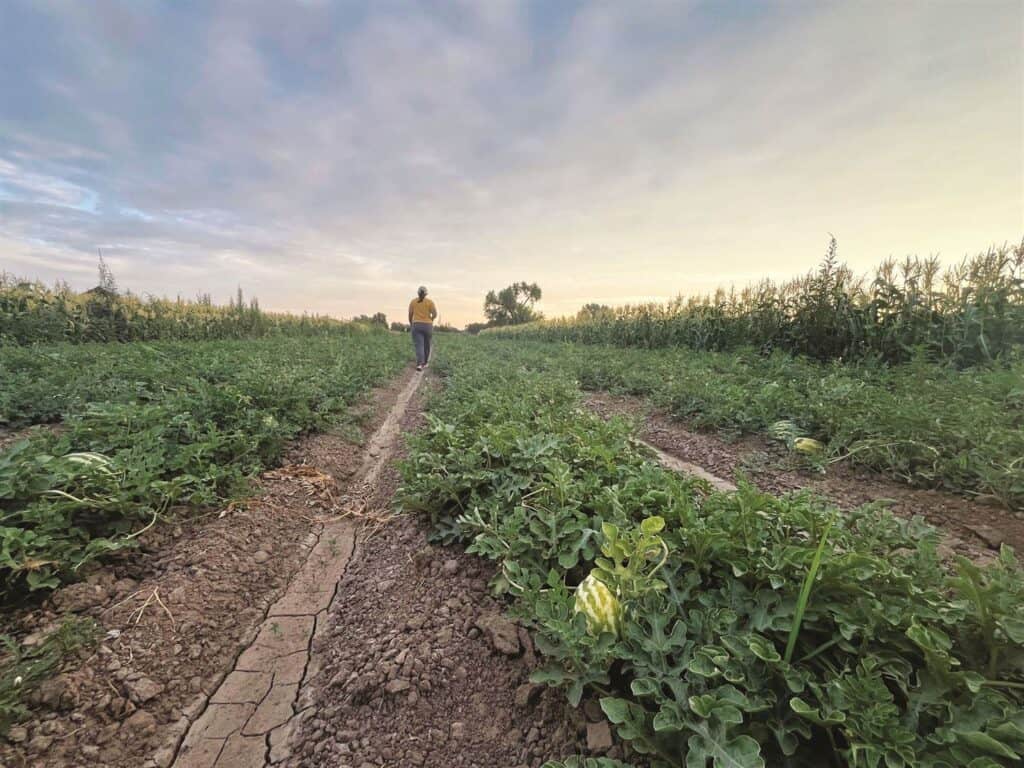
It’s still early in the season, but there are still reds to be found. There are boxes of greens as well for the customers that like to fry them. I learn to identify tomatoes at the breaker stage, which refers to when a tomato is not quite red but has received all the nutrients it needs from the vine. Picking at this stage will allow the tomato to continue to ripen, avoiding additional sun damage, and when applicable, allow time to transport to the stores.
I ask Adam about “vine ripened” tomatoes sold at the grocery stores. “A lot of that is marketing,” he says. If picked appropriately, they will ripen without it. “Some of it is simplifying things for the customer,” he adds.
Farming methods
Smith Farms officially sells conventional produce, but practices integrated pest management, which involves farming techniques that help preserve a healthier ecosystem. For Adam, this includes farming methods such as rotating crops on fields and using pesticides on an as-needed rather than a scheduled basis. This involves judgment calls from season to season, balancing the benefit of taking a hit to crop yields one year, with the long-term concerns over pesticide resistance. Many large farms use pesticides and weed killers on a scheduled basis, and he is concerned it will lead to widespread resistance among plants and bugs.

Adam eventually wants to implement more ecologically friendly, organic farming practices, including creating his own compost to minimize the use of synthetic fertilizers. Organic farming requires more labor for things such as manual weeding. Even though Smith Farms is a smaller farm, as a family enterprise, it depends on a handful of workers at any given time.
From a producer standpoint, Smith Farms is small at 60 acres. Medium farms have several hundred acres. Large ones are in the thousands. To Adam, keeping it small keeps things not only sustainable, but allows him to maintain crop quality.
“What’s so great about being this size is we get to actually pick ourselves,” he adds. “Though it’s harder work and though you are out in the heat, I think it’s important, especially for the couple guys I do have … to see us working alongside of them and taking pride in what we’re doing. It’s a team effort.”
Sasha agrees. Because help is limited, the family often relies on outside friends to chip in when they can, especially come harvest season.
“People you know in the community and people just coming together to keep Adam going. It’s a big thing,” Sasha said.
“I enjoy being a small producer and a small retailer and having our one location right there in Falcon,” Adam says. “We pick here all day long and haul it up at the end of the day.”
While the work does add up, it comes with a strong sense of purpose, which for the Smiths, includes doing their best to do things right for the good of their customers.





